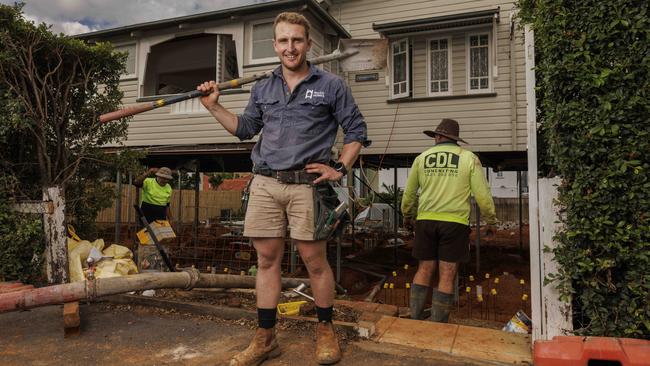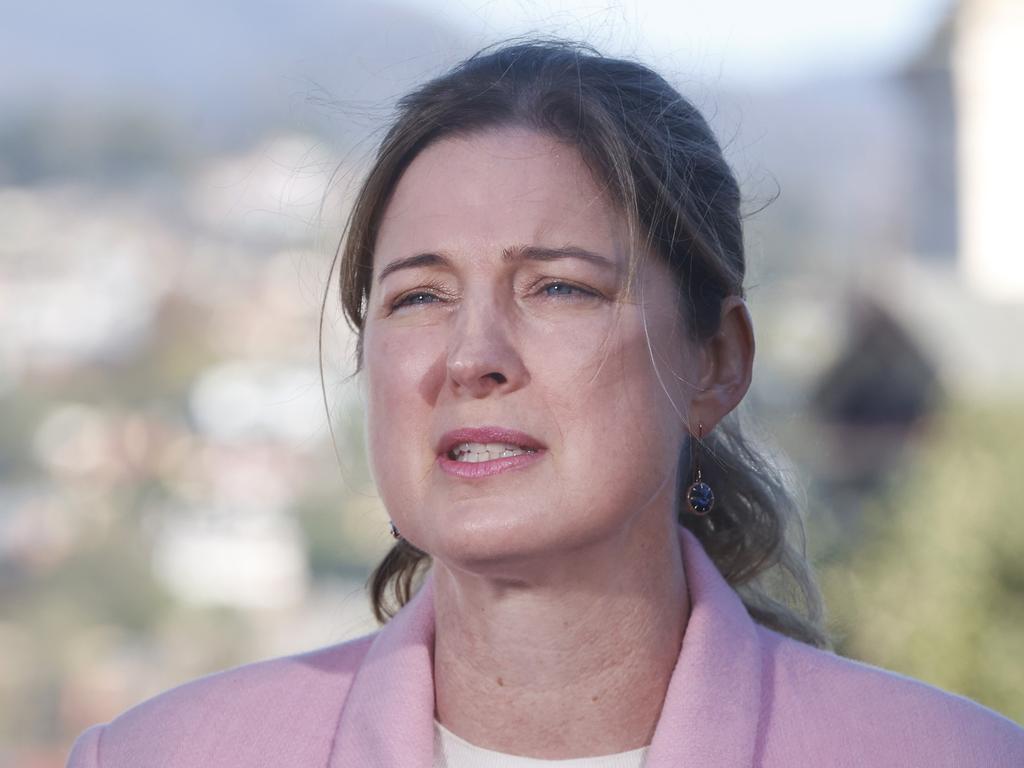Made in Australia push ‘to worsen housing crisis’
The building sector and civil contractors warn the Made in Australia agenda will exacerbate housing shortages and hamper the nation’s ability to meet its pledge to build 1.2 million homes.

Australia’s residential building sector and civil contractors are warning Anthony Albanese’s flagship Made in Australia agenda will exacerbate housing shortages and hamper the nation’s ability to meet its pledge to build 1.2 million homes.
The Housing Industry Association and the Civil Contractors Federation, Australia’s peak voice for the civil construction industry, say there is broad concern that workforce shortages in the sector would be exacerbated by the government’s pledge to bolster the domestic manufacturing industry through billions of dollars in subsidies and underwritten loans.
The warnings come as new research found building costs rose 6.2 per cent in the first quarter of the year as skilled tradies remain in short supply, with bricklayers, ceramic tilers, plasterers, carpenters and roofers the hardest tradespeople to find.
Jack Williams of Brisbane’s Wilco Homes said people had been pulling back on spending since interest rates began to rise, but demand remained strong. “We’ve had some massive interest rate hikes, but in terms of workload there’s still so much demand out there,” he said.
With escalating demand for tradespeople outside residential home building, HIA chief executive Jocelyn Martin told The Australian the government’s Made in Australia policy may detract apprentices seeking to enter residential construction.
Ms Martin warned Labor’s manufacturing agenda – expected to be a centrepiece of the government’s May 14 budget – lacked substance and urged Mr Albanese to “genuinely” support manufacturing industries amid concern existing subsidies were already creating perverse outcomes for businesses in NSW.
“We are already competing with large infrastructure projects anyway so there are already shortages brought about with large infrastructure projects, so, yes, there is a concern that the policy will detract from apprentices wanting to enter residential construction,” Ms Martin said.
“Really, there’s not enough people in the first place. We need additional people in the sector so if we start robbing Peter to pay Paul we really won’t get anywhere. It’s a broad concern at the moment and the plugs for manufacturing jobs will only make that worse.
“I think that public infrastructure projects are continuing to absorb skilled trades and will continue to worsen the shortfall in labour, which impacts the ability to deliver the 1.2 million homes and puts more pressure on the housing shortfalls and housing affordability.”
Labor’s industrial policy – aimed at supporting manufacturing in key industries such as the low-emissions sector – has sparked concerns from several distinguished economists and experts, including current and former Productivity Commission heads, that taxpayer money will be wasted on propping up uncompetitive companies.
Ahead of the budget, the HIA has called on the government to address skilled workforce shortages by supporting more apprentices to take up residential construction work and increase the number of skilled workers coming from overseas by creating a trade-specific visa program.
“To achieve a level of new housing supply that puts sustained downward pressure on housing costs we must boost the capacity of the construction labour force,” the submission said.
“The supply of skilled labour needs to improve, and the continued success of Australia’s construction sector hinges on sustained government support, particularly when it is anticipated that these shortages will only be exacerbated with the expected increased building activity driven by the federal government’s commitment to build 1.2 million homes over the next five years.”
Civil Contractors Federation chief executive Nick Proud said the government’s Made in Australia policy may lead to housing shortages, with not enough builders to construct houses without a national workforce plan.
Mr Proud said the government’s agenda, including Made in Australia, net-zero policies and the federal housing target, was under threat without stronger incentives, including more funding for civil and construction training as part of the budget.
“Made in Australia needs to be part of a holistic workforce plan, as at the moment the workforce that will be required to build solar panels will come from … the residential and civil construction (sector),” Mr Proud said.
“Unless there’s a national plan for the construction workforce, Made in Australia could lead to shortfalls in civil infrastructure and cause housing shortages.”
A government spokesman said housing had been a big priority of the Albanese government investing $25bn already.

“Housing has been a big priority of the Albanese Labor government – we’ve invested $25bn already and it will be a focus in the budget as well,” he said. “That already makes the housing industry one of the biggest beneficiaries of the Albanese government.”
Opposition housing spokesman Michael Sukkar said it was “no surprise” the Made in Australia policy would exacerbate housing shortages, and warned Labor would fall “far short” of its promise to build 1.2 million homes.
“With home ownership and the residential construction industry remaining at the bottom of Labor’s priority list, it comes as no surprise the Prime Minister’s ill-thought-out Made in Australia policy will only exacerbate Australia’s housing crisis – despite warnings directly from the building sector against it,” he said.
The latest HIA Trade Report found skilled workers are still in short supply, with those hiring landscapers, painters, and roofers paying almost 10 per cent more than they did a year ago. The number of new homes that began construction last year was the lowest level in a decade.
Fairfield City Mayor Frank Carbone said no one is building homes in Australia because it’s “not affordable” and developers were “leaving the housing market” in droves.
“It’s too expensive to build and there’s too many taxes,” he said.
“And at the same time, we have very high interest rates. Take the tax off the homes and give our children, our first-home buyers, a chance to own a home.”
Ahead of budget in just over two weeks, Judo Bank economist Warren Hogan urged the government to show fiscal discipline after higher-than-predicted inflation figures, warning extra spending would fuel inflation and make the Reserve Bank of Australia’s task to tame inflation harder.
“It sounds sensible that parts of our community are really hurting, these lower- and middle-income earners needs some support from this cost-of-living crisis,” he told Sky News.
“But … it just complicates the RBA’s job and makes it more likely they have to put up rates more so they just need to stick to their guns, stay disciplined, don’t go throwing money around and let the surplus flow through. That’s the challenge.”






To join the conversation, please log in. Don't have an account? Register
Join the conversation, you are commenting as Logout